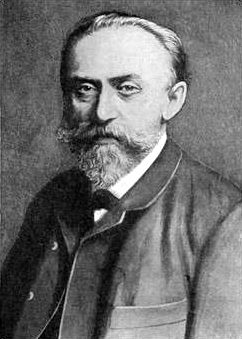By Alex Gordon


HAIFA, Israel –During his 75 years of life this man played many roles enough to last several lifetimes. He was a socialist, a revolutionary, a rebel, a man sentenced to death by hanging, an emigrant for nearly 20 years, a rich banker, a liberal, a statesman and a monarchist. He was Germany’s most important politician of Jewish origin in the nineteenth century. Moritz Busch, spokesman for the united German Chancellor Bismarck, called him the “Red Jew.” “The Red Jew” was probably the richest revolutionary in history. His range of occupations was immeasurably broad, and his activities were full of attempts to improve Germany and to forget the Jewish people. He became one of the first statesmen of a united Germany, but remained an outsider in the society of which he aspired to be a full member.
Ludwig Bamberger was born in Mainz in 1823 into a wealthy Jewish family of cosmopolitan bankers with connections and interests of pan-European importance. At the University of Heidelberg Bamberger, a student of law and philosophy, was popular, had republican views and was influenced by the writings of the French socialist utopians Saint-Simon and Fourier and the anarchist Proudhon. Because of his indifference to religion he was said to be “not a son of the synagogue, but a son of emancipation.” Jewish emancipation, the achievements of which the small community of Mainz enjoyed through the French occupation, was the dream of Jews in other German states. Bamberger considered Germany a backward country, he was a Francophile and saw the light for the Jews on the French side.
On February 25, 1848, news of the new French Revolution reached Heidelberg. King Louis-Philippe had been deposed. Bamberger responded, “In one blow a new world was born.” In Germany, as the socialist Bamberger expected, the arrival of the “new world” was delayed, and the newly minted doctor of the University of Heidelberg, who was not entitled as a Jew to work in his profession, decided to approach the dawn of socialism. He did not protest against the oppression of the Jews, but dissolved Jewish humiliation into a sea of socialist struggle for the good of the Germans. At the beginning of June 1849, Bamberger resigned from the newspaper Mainzer Zeitung and led a detachment of republican rebels who fought with arms against the government forces in the villages of Baden. The uprising was short, tragic, and futile. Bamberger and his defeated supporters retreated to Karlsruhe and there dispersed. On June 22, 1849, Bamberger crossed the Swiss border. Together with 300 insurgents, he was convicted in absentia for participation in armed insurrection and treason against the fatherland and sentenced to death by hanging.
At this revolutionary adventure, Bamberger’s socialist activities came to an end. The capitalist phase of his life had arrived. Louis Bischofsheim, the revolutionary’s Parisian uncle, who disapproved of his nephew’s views and actions, appointed Bamberger as an intern at the London branch of his bank. It was there that Bamberger met Karl Marx. It was not the ideas of the founder of communism that brought them together, but Marx’s need for money.
A picture of Marx’s need for money and his begging for loans, which he did not pay back, can be seen in his London correspondence with Engels, who was in Manchester. In a letter of March 10, 1853, Marx writes: “The ‘glorious’ Bamberger (the communist Marx, of course, does not like the capitalist Bamberger, so he puts glorious in quotation marks. – A. G.) gave me originally £5 under it, then made me run to and from the City for two weeks straight and paid the rest only that week after my landlady started ‘howling’ (literally) all day long.”
On July 8 of the same year, in a letter to Engels, Marx adds to his class hatred of Bamberger an antisemitic attitude: “Leaving for Manchester, I borrowed £2 from Jew Bamberger. Now this subject sends me rude letters demanding repayment, even threatening me. But we’ll see about that.” There is no doubt that Marx succeeded: he did not pay back the debt to the “Jew.” Marx regarded the Jews as an exploiting class.
Two years after beginning English service, his uncle transfers Bamberger to work as a bank clerk in Amsterdam. Marriage to Anne Belmont further strengthened Bamberger’s position in banking through the connections and influence of his wife’s uncle, the New York banker Auguste Belmont. In 1856, Bamberger was appointed director of a new bank in Paris, Paris et Pays Bas, founded by his uncle. The Bamberger couple settled in the elegant Place Vendôme. The bank director Bamberger was 33 years old. He managed to double his capital almost every year. Under Napoleon III’s regime, Bamberger was at first considered a dangerous revolutionary. The Paris police even put him under surveillance. But the French authorities soon realized what Karl Marx had realized much earlier: Bamberger was a real capitalist, and his socialist adventurism was long in the past.
By about age 40, Bamberger no longer had to work for a living. He became rich and lived off the interest from his capital and the income from his stocks. While living in France, Bamberger, despite his Francophilism, dreamed of returning to Germany and participating in its public life. In 1863 an amnesty for revolutionaries was declared. In 1866 Bamberger returned to Mainz.
Since 1864, Bamberger’s outlook began to change. The republican became a “realist.” He decided that a republic could not be an acceptable form of government. Germany must first be united under the umbrella of Prussia. Bamberger, a former socialist, changed his way of life and thought and joined the national-liberal party. The former banker became involved in the political life of Germany, which was on its way to unification.
The German historian Theodor Mommsen called Bamberger “a greater German than any other.” Bamberger criticized German submissiveness, Germans’ lack of civic courage, and drunkenness. At the same time, his Jewish traits also displeased him. He characterized the typical features of the Jews as follows: “insistence, tactlessness, greed, impudence, conceit, lack of honor, spiritual poverty, and servility.” Bamberger admired the fact that Jews were “Germanizing” not only in Germany but also in Eastern Europe. According to him, Jews speak German more than other peoples. Since “language is spirit,” there is a spiritual affinity between Jews and Germans.
Under Bamberger’s leadership, the election campaign for the Frankfurt parliament was held in Mainz. Despite accusations against Bamberger of treason against socialism and republicanism, he was elected to parliament. Prussia’s military success in 1866 further strengthened Bamberger’s belief in the need to unite the smaller German states under the Prussian Hohenzollern dynasty. He became a Prussian patriot and monarchist. During the Franco-Prussian War of 1870-1871, Bamberger was assigned to the personal staff of Chancellor Otto von Bismarck as an expert on France. Bamberger justified his monarchist views by his desire for democracy.
In 1871 Bamberger was elected from Mainz to the first German Reichstag and became, along with another Jew, Eduard Lasker, one of the leaders of the National Liberal Party. Thanks to Lasker’s support, a law was passed in 1876 on the right of Jews to leave the Jewish community without a change of religion. This law paved the way for the assimilation of the Jews. In the handbook of the German parliament it was noted that Bamberger had refrained from declaring his religious affiliation. He was the only Jewish deputy who did not acknowledge his origin. Bamberger became one of the founders of Deutsche Bank.
Bamberger did not realize that a united Germany would also become united in antisemitism. He suddenly discovered articles by Marr and Dühring about a new kind of Judophobia – racial hatred. Organized gangs were attacking Jews in the streets, kicking them out of cafes, breaking windows in stores owned by Jews. In the provinces, synagogues began to be set on fire. Bamberger continued to overlook the importance of strengthening the new ideological base of antisemitism in a united Germany. In the same year, he characterized politically organized antisemitism in society as the result of “unconscious emotion”. It was a flight from reality.
The greater economic success of the Jews, their higher income, and their rapid social advancement created German envy of them as non-Christians, outsiders, and upstarts. The Germans had an “advanced” religion, their own language, great philosophy, beautiful music, and a respect for order. And so, the German order, the Ordnung (order in German), was disrupted by foreigners ahead of them, not so long ago settling in ghettos, dressed in ridiculous clothes, and could not read German. They were German troublemakers and parvenu. Because of the traumas of the Thirty Years’ War and the Napoleonic conquests, the Germans needed to assert themselves. They had defeated the Austrians and the French, they had unified their disparate lands, but they could not defeat in fair combat the newly emerged Jews. They needed measures to “settle the unjust Jewish occupation” of Germany. The disruption of the German order, the Jews’ inexhaustible desire for knowledge and their scientific, financial and cultural successes ignited German envy to a level of anti-Jewish activity unprecedented in history, culminating in the Holocaust.
Bamberger never spoke out against antisemites in the Reichstag. However, his speech at Lasker’s grave (1884) testified to his feelings about the antisemitic bacchanalia: “Among everything that crushed our dear departed, one cannot remain silent about a peculiar phenomenon that has appeared in the last few years in Germany and that has invented a new kind of fanaticism to meet the needs of fanatics – racial fanaticism, as our times cannot tolerate religious fanaticism. This may have caused the deceased a great deal of suffering, but it would be wrong to think that he was particularly grieved for himself or those close by blood; no, these ugly phenomena caused pain in his heart because he considered them a stain on the German flag and saw in them the humiliation of Germany before himself and before the whole world.”
In 1892 Bamberger ended his political and social activities. He died in Berlin in 1899, having completed his memoirs in the year of his death. Historian Goetz Ali writes: “The tone of the memoirs was tired. It was the memoirs of a man who, in spite of his time as a deputy of the Reichstag, suffered personally from a new kind of German hostility toward the Jews.”
*
Alex Gordon is a native of Kiev, Ukraine, and graduate of the Kiev State University and Haifa Technion (Doctor of Science, 1984). Immigrated to Israel in 1979. Full Professor (Emeritus) of Physics in the Faculty of Natural Sciences at the University of Haifa and at Oranim, the Academic College of Education.